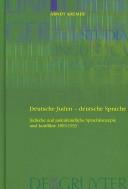| Listing 1 - 10 of 10 |
Sort by
|
Multi
ISBN: 9781611689853 1611689856 9781611689839 9781611689846 1512600776 161168983X 1611689848 Year: 2017 Publisher: Waltham, Massachusetts Brandeis University press
Abstract | Keywords | Export | Availability | Bookmark
 Loading...
Loading...Choose an application
- Reference Manager
- EndNote
- RefWorks (Direct export to RefWorks)
"This empirical study examines verbal manifestations of antisemitism in contemporary Germany through the lens of letters and emails to the Israeli embassy in Germany and other organizations" --
German language --- Public opinion --- Jews --- Social perception --- Stereotypes (Social psychology) --- Antisemitism in language --- Linguistics --- Antisemitism --- Israel --- Israelis --- Judaism --- Nazism --- Stereotype --- Discourse analysis. --- Public opinion. --- History --- Germany --- Ethnic relations.
Book
ISBN: 3484310839 3111683699 9783484310834 Year: 1988 Volume: 83 Publisher: Tübingen: Niemeyer,
Abstract | Keywords | Export | Availability | Bookmark
 Loading...
Loading...Choose an application
- Reference Manager
- EndNote
- RefWorks (Direct export to RefWorks)
""Früh-Antisemitismus"" in Deutschland (1789 - 1871/72) strukturelle Untersuchungen zu Wortschatz, Text und Argumentation
History of Germany and Austria --- Sociolinguistics --- anno 1800-1899 --- Anti-jewish attitudes --- Anti-semitism --- Antisemitism --- Antisemitisme --- Antisémitisme --- German language --- Antisemitism in language --- History --- Lexicology. --- -Antisemitism --- -Antisemitism in language --- -German language --- -Ashkenazic German language --- Hochdeutsch --- Judaeo-German language (German) --- Judendeutsch language --- Judeo-German language (German) --- Jüdisch-Deutsch language --- Jüdischdeutsch language --- Germanic languages --- Antisemitic language --- Antisemitism and language --- Language and antisemitism --- Language and languages --- Anti-Jewish attitudes --- Anti-Semitism --- Ethnic relations --- Prejudices --- Philosemitism --- -History --- -Lexicology --- Lexicology --- Ashkenazic German language --- Germany --- Antisemitism - Germany - History - 18th century. --- Antisemitism - Germany - History - 19th century. --- German language - 18th century - Lexicology. --- German language - 19th century - Lexicology. --- Antisemitism in language - Germany - History - 18th century. --- Antisemitism in language - Germany - History - 19th century.
Book
ISBN: 9782745350169 2745350161 9782745350176 Year: 2019 Volume: 66 Publisher: Paris: Honoré Champion,
Abstract | Keywords | Export | Availability | Bookmark
 Loading...
Loading...Choose an application
- Reference Manager
- EndNote
- RefWorks (Direct export to RefWorks)
Il s'agissait au départ de comprendre comment et pourquoi un aussi large public avait souscrit à un discours antisémite grossier et ahurissant. Un complément de réponse est venu de l'analyse de textes et d'images. Sous le simplisme apparent des préjugés antisémites se révèle une extrême sophistication, une manipulation aussi habile que retorse de l'éloquence. On a su pervertir les mots, les idées : cette violence verbale inouïe a déclenché l'engrenage des persécutions et exterminations. Le choix des mots et l'impact des images, la construction de l'argumentaire, la stratégie de la communication : tout converge pour démontrer le mécanisme de la haine ; ses sources, son fonctionnement et ses effets.
Antisémitisme. --- Haine. --- Rhétorique. --- Antisémitisme --- Haine --- Rhétorique --- Antisemitism --- Antisemitism in language --- Anti-Jewish propaganda --- Antisemitic propaganda --- Propaganda --- Antisemitic language --- Antisemitism and language --- Language and antisemitism --- Language and languages --- 296.2 --- 296.2 Antisemitisme --- Antisemitisme
Book
ISBN: 9782745356345 2745356348 9782745356352 2745356356 Year: 2022 Publisher: Paris : Honoré Champion éditeur,
Abstract | Keywords | Export | Availability | Bookmark
 Loading...
Loading...Choose an application
- Reference Manager
- EndNote
- RefWorks (Direct export to RefWorks)
Dans la Rhétorique de la haine, l’auteure s’interrogeait sur la manière dont les mots avaient fondé et accrédité le discours antisémite dans le passé. Aujourd’hui, l’antisémitisme est plus que jamais d’actualité. Les vieux préjugés sont réactivés, avec de nouvelles formules : ils circulent notamment sur Internet et sur les réseaux sociaux. L’analyse met au jour les stratégies des manipulateurs, protégés par l’anonymat. Une pléiade de groupuscules politiques et religieux, diverses organisations occultes, et des individus se réclamant du « peuple », déclinent les mêmes formules contre « le Juif », éternel bouc émissaire qui cristallise jalousies et rancœurs. Le propos est souvent lapidaire et vulgaire, abusant des amalgames et des simplifications
Antisemitism --- Online hate speech --- History --- Antisemitism in language --- Antisemitic language --- Antisemitism and language --- Language and antisemitism --- Language and languages --- Internet hate speech --- Hate speech --- Anti-Jewish attitudes --- Anti-Semitism --- Ethnic relations --- Prejudices --- Philosemitism --- 296.2 --- 296.2 Antisemitisme --- Antisemitisme

ISBN: 9783110196030 3110196034 3110958163 Year: 2007 Publisher: Berlin Walter de Gruyter
Abstract | Keywords | Export | Availability | Bookmark
 Loading...
Loading...Choose an application
- Reference Manager
- EndNote
- RefWorks (Direct export to RefWorks)
#KVHA:Taalwetenschap; Duits --- #KVHA:Sociolinguïstiek; Duits --- #KVHA:Joodse taal --- German language --- Antisemitism in language. --- Yiddish language --- Jews --- Taal. --- Taalgebruik. --- Joden. --- Vaderlandsliefde. --- Anti-judaïsme. --- Antisemitisme. --- Akkulturation. --- Antisemitismus. --- Deutsch. --- Juden. --- Kulturelle Identität. --- Kulturzionismus. --- Sprache. --- Nationalismus. --- Jiddisch --- Tyska språket --- Antisemitism --- Yiddish language. --- Political aspects. --- Language --- Politiska aspekter. --- Språk. --- Geschichte 1893-1933. --- Duitsland. --- Deutschland. --- Germany. --- Antisemitism in language --- German Hebrew --- Hebreo-German language --- Jewish language --- Jiddisch language --- Judaeo-German language (Yiddish) --- Judeo-German language (Yiddish) --- Hebrews --- Israelites --- Jewish people --- Jewry --- Judaic people --- Judaists --- Ethnology --- Religious adherents --- Semites --- Judaism --- Antisemitic language --- Antisemitism and language --- Language and antisemitism --- Language and languages --- Political aspects --- Languages

ISBN: 2742700943 9782742700943 Year: 1993 Publisher: Arles: Actes Sud,
Abstract | Keywords | Export | Availability | Bookmark
 Loading...
Loading...Choose an application
- Reference Manager
- EndNote
- RefWorks (Direct export to RefWorks)
Sociology of minorities --- Political philosophy. Social philosophy --- Jewish religion --- Antisemitism --- Antisemitism in language --- Jews --- Antisémitisme --- Antisémitisme dans le langage --- Juifs --- Identity --- Identité --- Faye, Jean Pierre, --- Interviews --- Holocaust, Jewish (1939-1945) --- History --- Influence --- Antisémitisme --- Antisémitisme dans le langage --- Identité --- Interviews. --- Antisemitism - History --- Jews - History --- Jews - Identity --- Holocaust, Jewish (1939-1945) - Influence
Book
ISBN: 1512600776 161168983X 1611689856 1611689848 Year: 2017 Publisher: Waltham, MA, USA Brandeis University Press
Abstract | Keywords | Export | Availability | Bookmark
 Loading...
Loading...Choose an application
- Reference Manager
- EndNote
- RefWorks (Direct export to RefWorks)
"This empirical study examines verbal manifestations of antisemitism in contemporary Germany through the lens of letters and emails to the Israeli embassy in Germany and other organizations" --
Antisemitism in language --- Stereotypes (Social psychology) --- Social perception --- Jews --- Public opinion --- German language --- History --- Public opinion. --- Discourse analysis. --- Germany --- Ethnic relations. --- Mental stereotypes --- Stereotype (Psychology) --- Stereotyping (Social psychology) --- Social psychology --- Attitude (Psychology) --- Rigidity (Psychology) --- Antisemitic language --- Antisemitism and language --- Language and antisemitism --- Language and languages --- Judaism --- Cognition, Social --- Interpersonal perception --- Social cognition --- Interpersonal relations --- Perception --- Social cognitive theory --- Linguistics --- Antisemitism --- Israel --- Israelis --- Nazism --- Stereotype
Book
ISSN: 21929602 ISBN: 3110553988 3110277727 3110277689 1299719015 Year: 2013 Volume: Bd. 7 Publisher: Berlin : Walter de Gruyter,
Abstract | Keywords | Export | Availability | Bookmark
 Loading...
Loading...Choose an application
- Reference Manager
- EndNote
- RefWorks (Direct export to RefWorks)
Wie artikuliert sich im 21. Jahrhundert judenfeindliches Gedankengut? Und wann ist eine Äußerung antisemitisch? Mit diesen Fragen beschäftigen sich die Sprach- und Kognitionswissenschaftlerin Monika Schwarz-Friesel und der Historiker Jehuda Reinharz anhand einer datenreichen Untersuchung des aktuellen judenfeindlichen Sprachgebrauchs. Die detaillierte Analyse der diversen Manifestationsformen von direktem und indirektem Verbal-Antisemitismus zeigt, welche geistigen Konzepte und emotionalen Ressentiments judeophoben Einstellungen zugrundeliegen. Diese äußern sich in uralten Klischees und Verschwörungstheorien ebenso wie in neuen, israelbezogenen Stereotypen. Die Studie zeigt, wie Juden als Juden verbal ausgegrenzt und beleidigt, belehrt, ermahnt und bedroht werden, und dass judenfeindliche Äußerungen von vielen Menschen artikuliert werden, als hätte es den Holocaust und seine intensive Aufarbeitung nie gegeben.
Antisemitism in language --- Stereotypes (Social psychology) --- Social perception --- Jews --- Public opinion --- German language --- History --- Public opinion. --- Social aspects. --- Germany --- Ethnic relations. --- Judaism --- Cognition, Social --- Interpersonal perception --- Social cognition --- Mental stereotypes --- Stereotype (Psychology) --- Stereotyping (Social psychology) --- Antisemitic language --- Antisemitism and language --- Language and antisemitism --- Interpersonal relations --- Perception --- Social cognitive theory --- Social psychology --- Attitude (Psychology) --- Rigidity (Psychology) --- Language and languages --- Anti Semitism. --- Anti Zionism. --- Central Council. --- Cognitive Science. --- Linguistic Analysis.
Book
ISBN: 3030701034 3030701026 Year: 2021 Publisher: Cham : Springer International Publishing : Imprint: Palgrave Macmillan,
Abstract | Keywords | Export | Availability | Bookmark
 Loading...
Loading...Choose an application
- Reference Manager
- EndNote
- RefWorks (Direct export to RefWorks)
This book examines the most frequent form of Jew-hatred: Israel-related antisemitism. After defining this hate ideology in its various manifestations and the role the internet plays in it, the author explores the question of how Israel-related antisemitism is communicated and understood through the language used by readers in below-the-line comments. Drawing on a corpus of over 6,000 comments from traditionally left-wing news outlets The Guardian and Die Zeit, the author examines both implicit and explicit comparisons made between modern-day Israel and both colonial Britain and Nazi Germany. His analyses are placed within the context of resurgent neo-nationalism in both countries, and it is argued that these instances of antisemitism perform a multi-faceted role in absolving guilt, re-writing history, and reinforcing in-group status. This book will be of interest not only to linguistics scholars, but also to academics in fields such as internet studies, Jewish studies, hate speech and antisemitism. Matthias J. Becker is a Postdoctoral Researcher at the Center for Research on Antisemitism (ZfA) at the Technical University Berlin, Germany where he currently leads the interdisciplinary project “Decoding Antisemitism: An AI-driven Study on Hate Speech and Imagery Online”. He is also Research Fellow at CENTRIC, Sheffield Hallam University, UK, at the Haifa Center for German and European Studies (HCGES) at the University of Haifa and the Vidal Sassoon Center at Hebrew University, Israel. In his studies, he focuses on the pragmalinguistic analysis of hate speech in mainstream society and on the internet.
Antisemitism in the press --- Antisemitism in language. --- Antisemitic language --- Antisemitism and language --- Language and antisemitism --- Language and languages --- Press --- Psycholinguistics. --- Pragmatics. --- Jews --- Judaism and culture. --- Digital humanities. --- Psycholinguistics and Cognitive Lingusitics. --- Jewish Studies. --- Jewish Cultural Studies. --- Digital Humanities. --- Jewish studies --- General semantics --- Logic, Symbolic and mathematical --- Semantics (Philosophy) --- Humanities --- Culture and Judaism --- Culture --- Language, Psychology of --- Psychology of language --- Speech --- Linguistics --- Psychology --- Thought and thinking --- Study and teaching. --- Philosophy --- Psychological aspects
Book
ISBN: 9780521888660 0521888662 Year: 2009 Publisher: Cambridge Cambridge University Press
Abstract | Keywords | Export | Availability | Bookmark
 Loading...
Loading...Choose an application
- Reference Manager
- EndNote
- RefWorks (Direct export to RefWorks)
History of Germany and Austria --- anno 1940-1949 --- anno 1930-1939 --- anno 1920-1929 --- Antisemitism in the press --- Antisemitism in language --- Jews --- German language --- Mass media --- Press and politics --- Government and the press --- Holocaust, Jewish (1939-1945) --- Antisémitisme dans la presse --- Antisémitisme dans le langage --- Juifs dans la presse --- Allemand (Langue) --- Médias --- Presse et politique --- Etat et presse --- Holocauste, 1939-1945 --- Press coverage --- Social aspects --- History --- Causes. --- Aspect social --- Histoire --- Causes --- Germany --- Allemagne --- Ethnic relations. --- Relations interethniques --- Antisémitisme dans la presse --- Antisémitisme dans le langage --- Médias
| Listing 1 - 10 of 10 |
Sort by
|

 Search
Search Feedback
Feedback About UniCat
About UniCat  Help
Help News
News